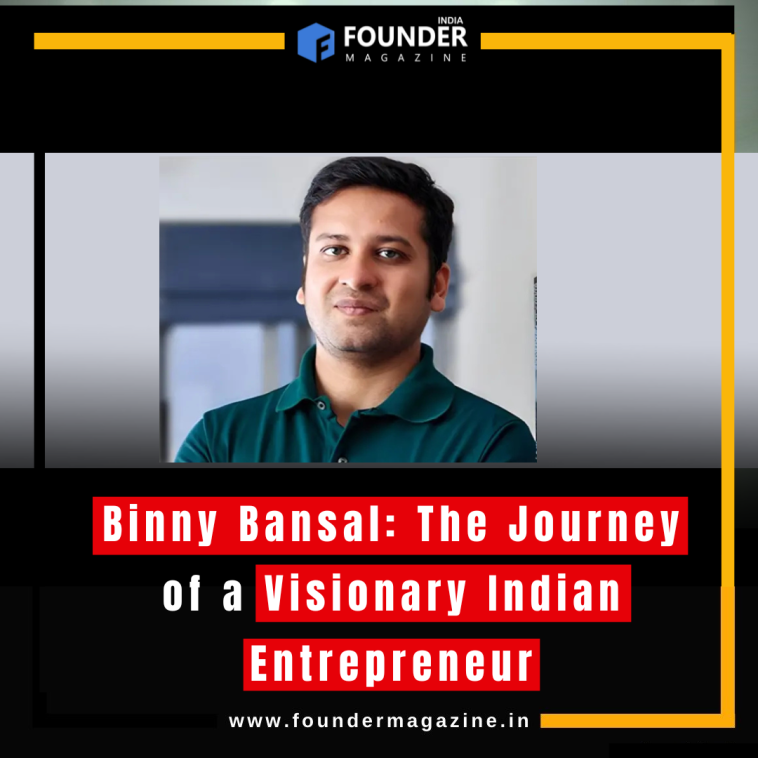Binny Bansal, a name synonymous with the success of India’s e-commerce revolution, has firmly established himself as one of the most influential entrepreneurs in the country. As of February 2024, Bansal’s net worth is estimated at a staggering $1.4 billion, a testament to his extraordinary journey in building one of India’s most iconic tech companies, Flipkart. His entrepreneurial story is not just about financial success but about innovation, resilience, and transforming India’s retail landscape.
The Beginning: From IIT to Flipkart
Binny Bansal’s journey into the world of entrepreneurship began in his early academic years. Born in Chandigarh, India, Bansal completed his schooling in his hometown before moving on to the prestigious Indian Institute of Technology (IIT) Delhi. At IIT, he forged a strong bond with Sachin Bansal, a fellow student with whom he would later co-found Flipkart. While pursuing his engineering degree, Bansal demonstrated early signs of his entrepreneurial mindset, excelling not only in academics but also in various leadership roles. After graduation in 2005, he worked for a brief period at Amazon, where he learned the intricacies of e-commerce, a field that would become his life’s passion.
Co-founding Flipkart: A Vision to Disrupt Retail
In 2007, Binny Bansal and Sachin Bansal (no relation) co-founded Flipkart, aiming to disrupt the Indian retail market. The idea stemmed from their realization that the Indian e-commerce sector was in its infancy and that the potential for online retail in a country with over a billion people was enormous. Initially, Flipkart started as an online bookstore, but the vision was always bigger. The company quickly expanded its offerings to include electronics, clothing, and various consumer goods.
The Bansals, armed with a clear vision and a deep understanding of the Indian market, faced numerous challenges. The infrastructure for e-commerce in India was underdeveloped, internet penetration was low, and online payment systems were untrusted by the general population. However, the duo was determined to overcome these hurdles by offering customer-centric services, improving logistics, and introducing features like cash on delivery, which made it easier for Indian consumers to shop online.
Flipkart’s rapid rise was not without its challenges. However, the company’s ability to innovate, improve customer experience, and offer personalized services gave it a competitive edge. As a result, Flipkart became one of the dominant players in India’s e-commerce space, competing with global giants like Amazon and local startups like Snapdeal.
Bansal’s Leadership: From COO to CEO
In the early years, Binny Bansal served as the Chief Operating Officer (COO) of Flipkart, overseeing the company’s operations, logistics, and day-to-day functioning. His role was pivotal in scaling the company’s operations across India. His leadership helped Flipkart grow into a formidable force in Indian e-commerce, a sector that was rapidly evolving.
In January 2016, after Flipkart raised a substantial amount of funding, Binny Bansal was promoted to the position of Chief Executive Officer (CEO), taking on the responsibility of guiding Flipkart to even greater heights. Under his leadership, Flipkart continued to innovate, launching new services, enhancing its technology stack, and expanding its reach into new markets.
The Sale to Walmart and Aftermath
In 2018, Flipkart made headlines with a landmark deal when it was acquired by Walmart for $16 billion, one of the largest e-commerce transactions in history. This move allowed Flipkart to expand its reach and resources, while also cementing Binny Bansal’s position as one of India’s foremost entrepreneurs. Following the acquisition, Binny Bansal stepped down from his role as CEO but continued to be involved in the company as a shareholder and mentor.
In the years following Flipkart’s acquisition, Binny Bansal has diversified his investments and shifted focus to other ventures, including startup incubation, venture capital, and technology. His entrepreneurial journey remains an inspiration for countless aspiring entrepreneurs in India and around the world.
Conclusion
Binny Bansal’s story is a remarkable tale of vision, perseverance, and transformation. From a small startup in Bangalore to creating an e-commerce behemoth, Flipkart’s rise has reshaped the Indian retail market and elevated Bansal to billionaire status. His journey reflects the changing landscape of India’s tech and business ecosystem, where a new generation of entrepreneurs is redefining success on their terms. Today, Bansal continues to inspire future generations with his innovative approach, leadership, and unwavering determination to challenge the status quo.4o mini


